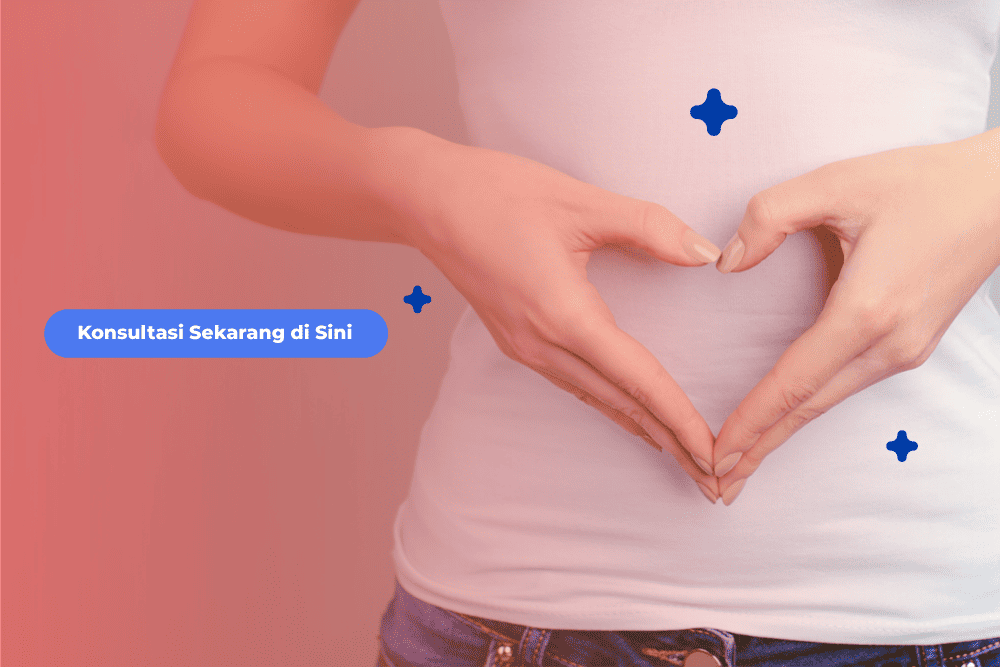Share This Article
Make sure to check the signs of early pregnancy and the health of you and your family regularly through Good Doctor, a 24/7 service. Consult your pregnancy health with our specialist doctor partners. Download the Good Doctor application now, click here , OK!
Pregnancy is certainly exciting news for a married couple. It’s not surprising that many couples want to quickly find out or try to find out the signs of one week of pregnancy. Although the signs of pregnancy are difficult to see.
Generally, pregnant women will show early signs with symptoms of late menstruation . At that time, there will be a feeling of cramps in the stomach, the appearance of blood spots, nausea, and even vomiting. The following is a complete explanation of the signs of early pregnancy.

Signs of 1 week of early pregnancy
Even though it is a little difficult to identify, the characteristics of 1 week of early pregnancy may be known by looking at a number of special symptoms. Before discussing further, first know how pregnancy is calculated.
A woman is not really pregnant in the first week if her pregnancy is calculated as 40 weeks from the first day of menstruation (LMP). New pregnancy occurs at the end of the 2nd or 3rd week and depends on the fertile period or ovulation.
When ovulating, the ovary releases the egg and moves towards the fallopian tube. And to achieve pregnancy, the egg must meet sperm in the fallopian tube.
The ovulation cycle that determines the date of fertilization generally occurs on days 13 to 20 after HPHT. However, ovulation can also depend on how long your menstrual cycle is.
In general, the menstrual cycle lasts 28 days. But every woman doesn’t have to have the same cycle.
To find out the pattern of your menstrual cycle, you can record your menstrual dates for several months. However, the easiest way to find out is with an ovulation test using urine.
Symptoms and signs of early pregnancy
The most commonly known characteristic of early pregnancy is late or no menstruation several weeks after conception. But not only that, other symptoms may also appear, such as
1. Breasts are more sensitive
Early pregnancy is easiest to see from the symptoms of the breasts appearing swollen and sensitive, even painful when touched. This symptom actually does not always appear as a characteristic of early pregnancy.
Increased estrogen and progesterone hormones will cause this. This condition usually occurs 1-2 weeks after fertilization. Swollen breasts can also occur because they retain a lot of fluid, making them feel heavy and sensitive.
2. Flatulence
An increase in the hormone progesterone will cause pregnant women to experience discomfort in the stomach. As a result, nausea accompanied by the desire to vomit will be felt.
Nausea is actually not only felt in the morning, although most pregnant women only feel it in the morning. Nausea can occur at any time because it is closely related to pregnancy hormones.
Some pregnant women will also feel sudden pain in the waist and this will continue throughout pregnancy. Weight gain and changes in body posture cause this.
Lower back pain will usually continue as the pregnancy progresses.
3. Signs of pregnancy such as the body getting tired easily
The next characteristic of early pregnancy is a body that gets tired easily. Even though you are still in the early stages of pregnancy, pregnant women will usually feel that their body is very tired.
Even though he doesn’t do heavy work, he still feels very tired. This condition usually coincides with other characteristics of early pregnancy. For example, a very fast heartbeat.
Actually, to overcome this, pregnant women get enough rest so they don’t feel very tired.
4. Feeling like you want to urinate
In the first week of pregnancy, it is possible that the enlarging uterus has not resulted in significant bladder pressure, causing complaints of frequent urination.
As a result, the bladder will be compressed and cause a feeling of wanting to empty naturally. It is not surprising that you will feel like urinating and this is a sign of pregnancy at the beginning of the week.
5. Can’t eat
Pregnant women will experience sudden changes in progesterone levels. Elevated levels of this hormone will cause an uncomfortable reaction for the body. One of them is appetite disorders.
Pregnant women will experience discomfort in the stomach, constipation, nausea, and a feeling of a very empty stomach.
6. Signs of pregnancy include sudden emotional changes
Hormonal changes also indicate pregnancy. So it’s not just menstruating that someone experiences emotional changes. Hormonal changes accompanied by sudden emotional changes will cause pregnant women to experience mood swings.
Sometimes you can be very angry, then sad, and even suddenly happy. Actually, this does not require any treatment. As long as the partner can understand this condition, pregnant women will not easily experience stress.
Also read: Bleeding during early pregnancy? Come on, get to know the causes
Characteristics of early pregnancy
Apart from the symptoms and signs as described above, signs that a person is pregnant can also be seen from several other things which include:
- Lower back pain . Cramps, bloating, constipation usually cause back pain in early pregnancy.
- Sensitive to smells . Increasing estrogen levels can increase your sense of smell, making you more sensitive to odors.
- Nausea in the morning ( morning sickness )
- Has bloodstains on his trousers. Usually spotting can appear 1-2 weeks after fertilization
- Acne appears . Soaring hormone levels make it easier for bacteria to grow, causing acne to appear.
- Brighter skin. Usually this is referred to as ” pregnancy glow” due to a surge in hormones in the body.
- The heart beats faster . When a fetus is growing, the heart needs to work harder
- Get thirsty easily . One of the characteristics of pregnancy is frequent urination, so the body becomes thirsty more easily.
- Darkening of skin areas. Pregnant women will have dark skin color that stretches from the navel to the genitals.
- Hard to sleep . Most women experience insomnia during early pregnancy.
- Hard to breathe . In the first few weeks, shortness of breath may occur because the body has to share oxygen and blood with the fetus.
Signs that people are pregnant sometimes look like PMS so they are often ignored. However, the signs of pregnancy in each woman can also be different so that when you experience one of them, you cannot immediately confirm that you are pregnant.
What do you feel in your stomach during early pregnancy?
Signs of pregnancy are identical to the stomach starting to enlarge. However, the difference in a 1 week pregnant stomach will not immediately be visible because no baby has yet to grow or form.
In general, when your stomach is 1 week pregnant, it feels like you are experiencing menstruation. The stomach may feel uncomfortable. There is a feeling of bloating and cramping but you need to know that there is no baby inside yet.
Even if an ultrasound is performed on the stomach of a 1 week pregnant woman, it will not produce any images. So you need to wait at least until the fourth week until you can see the shape of the fetus in the stomach.
Signs of early pregnancy before menstruation
Some signs of pregnancy can also appear before menstruation. This makes it possible for someone not to realize that they are pregnant.
So, so that you understand better, here are the possible signs of pregnancy before menstruation:
- Sore or sensitive breasts. Breasts may also feel tender to the touch, or fuller or heavier than usual.
- The areolas are getting darker. The areola, namely the area around the nipple, will darken one to two weeks after fertilization.
- Fatigue. Signs of pregnancy before menstruation that are similar to PMS are fatigue due to hormonal changes. Plus blood sugar levels and blood pressure become lower.
- Nauseous. Nausea is also common and for some women.
- Discharge from the vagina. As a sign of pregnancy, increased vaginal discharge on the body is very common. This vaginal discharge is sticky, white or pale yellow mucus.
- Implantation bleeding. Implantation bleeding may occur in the form of spotting or light bleeding. Generally, this sign of pregnancy before menstruation lasts one to three days and occurs a week before menstruation.
The above signs of pregnancy can occur from the first week and develop throughout pregnancy. Each woman may experience differences so that the signs of pregnancy cannot be the same for everyone.
A healthy pregnancy can start even before pregnancy. So, while making sure you and your partner take care of each other’s health. Don’t forget to always record the date of menstruation and pay attention to fertility signals in the body.
To find out certainty about pregnancy, an examination by a doctor is important. Also make sure to always be honest with your doctor about your medical history. That way, the inspection will run more smoothly.
During your consultation with a doctor, you can also express various concerns about pregnancy. Especially if this is your first pregnancy.
What time is an accurate pregnancy test?

To confirm whether you are pregnant or not, you can do a test using a test pack. But, when is the best time to do a pregnancy test?
It’s a good idea not to do a pregnancy test at night . The main purpose of carrying out a pregnancy test is to check the hCG hormone or human chorionic gonadotropin , which is a hormone produced by the placenta during pregnancy.
Testing at night is not ideal because the test pack cannot capture the hCG hormone well. This hormone is released with urine in the morning and gives a strong reading, which is why pregnancy readings tend to be accurate in the morning.
Here are some tips for taking a pregnancy test to get accurate results:
- Pay attention to your menstrual cycle : A pregnancy test using urine will give accurate results about a week after you miss your menstrual cycle. If your menstrual cycle is irregular, you should wait about 2 weeks from the date of potential conception.
- Do it in the morning : The morning is the best time to do a urine pregnancy test, because the hCG levels in urine are concentrated after a night without much drinking or urinating.
- Watch for signs of pregnancy : If you’re experiencing morning sickness, breast tenderness, or other early signs of pregnancy, you may want to think about the date of your last period and determine if there’s enough time to get accurate results.
Make sure to check your and your family’s health regularly through Good Doctor, a 24/7 service. Consult your pregnancy health with our specialist partners. Download the Good Doctor application now, click this link , OK!


